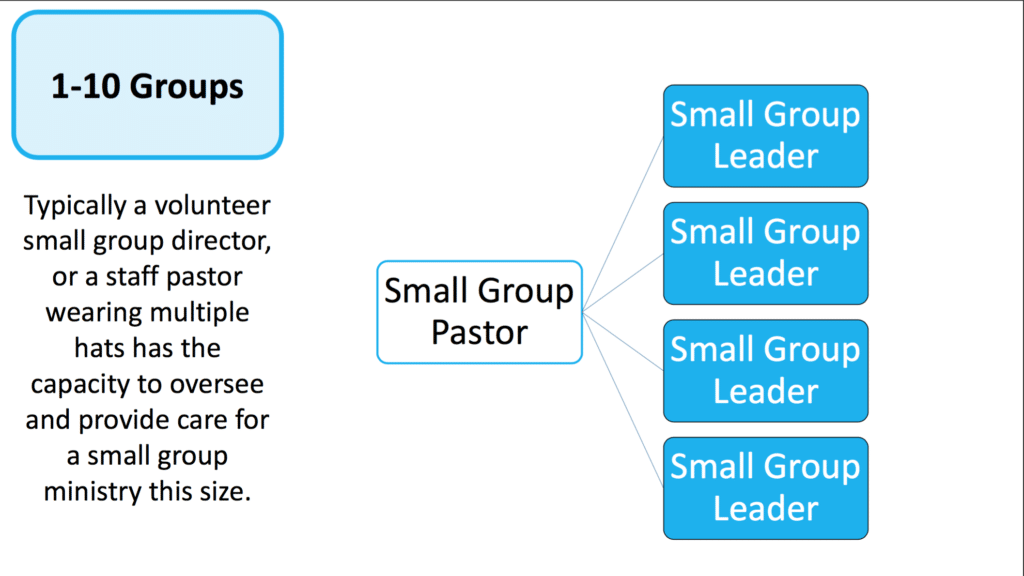Learn how to start a small group ministry at your church. This step-by-step guide will teach you how to launch, grow, and maintain an effective small group ministry!
A few years ago, I was wrestling with how to start a small group ministry. Incredible small group ministry does not just happen. Effective small group ministries have leaders who are intentional about learning and communicating why small groups matter.
Taking the time to learn how to start a small group ministry will ensure small groups at your church successfully launch and thrive. There are essential steps to take along the way to build a healthy and successful small group ministry.
Six Important Steps | All The Need To Know For How To Start Small Groups In Church
1. Understanding Why Small Groups Matter
2. Creating A Vision For Small Group Ministry
3. How To Establish Buy-In From The Top Down
4. Building A Small Group Ministry Team
5. Strategies For An Effective Small Group Ministry Launch
6. What Should A Small Group Ministry Accomplish
Don’t worry; this guide will tell you what to do and how to do it. This post is a comprehensive, hold-you-by-the-hand, step-by-step resource available for learning how to start a small group ministry.
Follow this powerful framework at your own pace for free Each step will guide you toward exactly what to do next and is outlined below.

How To Start A Small Group Ministry
Step One: Understand Why Small Groups At Church Are Important
Small Groups can play an important role in fulfilling the Great Commission to lead people to Jesus and a deeper relationship with God.
Community is vital for believers. The church does not just exist within the four walls of a building but inside our homes, neighborhoods, and communities.
Small groups should intentionally create an opportunity for believers and non-believers to experience community and grow spiritually through bible study and connecting with others.
5 Benefits Of Facilitating Small Groups In Your Church
- Christian Friendship Inspires Christian Living
- Accountability Will Produce Sincerity
- It Opens the Opportunity to Invite the Lost
- Extends the Pastoral Reach of Leaders & Churches
- Connection Leaves Little Reason for Leaving
What Is The Purpose Of Small Groups At Church?
Simply put, small groups can provide an opportunity to grow, laugh, serve, and connect with others for God’s glory.
Small groups vary in size, interest, meeting place, type, etc. Ultimately, small groups should facilitate Christian community and spiritual growth, whether a group is having a Bible study, serving the community, or sharing a common interest.
We read accounts in the Bible of different types of small groups existing in the early church (Acts 2:46, 12:12, 20:2).
Small groups also allow Christians to minister to one another and others (Gal. 6:2; Col. 3:16; Heb. 3:13, 10:24-25; James 5:16; I Peter 4:8-9).
Step Two: Create A Vision For Small Groups At Your Church
To effectively start a small group ministry, you must have a compelling vision.
Start by answering two questions to help solidify a vision for small groups at your church.
- Why are small groups worth people’s time?
- How will a small group ministry benefit your church?
Use your answers to formulate a vision. Sharing a vision is like painting a picture. Others need to visualize with you the impact groups can have and why they are important.
Below are more questions to answer to help you dive further into the vision process.
Answering these questions will help you understand how to launch a small group ministry at your church.
- What is your church already passionate about?
- What skills are already present within your team or congregation that could help build or enhance a small group ministry?
- Which values does your church already have that small groups could help reinforce?
OK, ready for this?
A few more questions for you to answer will further help you clarify a vision for the potential of small groups within your church.
The first step is to answer, What Is?
- What is the current condition of your church?
- How do people seem to relate to one another?
- Is there a connection?
- Is your church open to outsiders?
- Do outsiders feel welcomed?
Next answer, What If?
- What could happen if your church began to focus on facilitating relationships and friendship?
- How would the people of your church feel if they knew they were trusted and empowered to lead?
The last answer, Why Not?
- Why couldn’t your church experience significant change?
- Why couldn’t God raise leaders to help facilitate small groups?
The Body of Christ is dynamic because every church is different and unique. Describe how you see small groups being a vital part of your church. Use all of your responses to create a brief one to three-sentence vision statement for a small group ministry at your church.
Finally, ask two more clarifying questions about the vision you’ve created for a church of small groups.
- Does the vision you’ve created align with God’s heart?
- Does the mission you’ve established for groups align with the mission of your church?
If not, is it possible that your church’s mission needs realigning?

Step Three: Establish Buy-In From The Senior Pastor And Why You Need Everyone On Board
Without “buy-in” from the team, especially senior leadership, small groups will only be a fraction of what they could be.
Honestly, small groups will never be what they could and should be without buy-in from the senior pastor.
Creating a culture of ownership is crucial to the success of your small group ministry!
The good news is buy-in is possible, and ownership can be shared!
The hesitancies your senior pastor or others may have toward starting a small group ministry is normal.
4 Common Hesitencies Church Leaders Have Toward Small Group Ministry
- A small group ministry will take time to build.
- Will they create problems?
- What if they take away from the weekend service?
- What if the small group leaders talk about things I don’t approve of?
As I said, those are common questions, and it’s ok if people ask them.
To create a successful small group ministry, you must emphasize why small groups matter!
Creating a dynamic small group ministry is possible with the right insight, guidance, and vision.
The Building Healthy Small Groups Toolkit includes the 6 Steps To Launch, Grow And Maintain A Healthy Small Group Ministry, a 120-page downloadable workbook, and access to additional bonus worksheets and resources.

Get Instant Access
5 Ways To Share Why Small Groups At Church Are Important
As a leader, you can share how small groups build community and foster spiritual growth.
- They are an opportunity for a deeper level of friendship and connection.
- A small group environment can be less intimidating to those outside the church.
- Small groups expand the reach of care for the church beyond the senior pastor and staff.
- If people are connected to others in your church, it will make them less likely to leave the church.
- Share small group success stories.
If you are pioneering or already leading a small group ministry at your church, there’s no doubt there will be times when it is tough. In these times, you must do a few things:
- You have to model a commitment to the ministry.
- Determine to keep learning.
- Remind yourself why you are building a small group ministry.
Leadership is not for the faint of heart. It takes grit and determination. But you can do this!

Step Four: Build A Small Group Ministry Team
To build a great team, you need to know who you need on your team.
You want people on your team who share and can replicate your heart toward small group ministry.
The next question is, How do I find people who share my heart? You find these people by sharing your heart. You must share your passion for small group ministry with the people you talk to.
When sharing vision, share more than needs; share why it matters. Let others know why it’s important and how it can make a difference!
5 Steps To Build A Small Group Ministry Team:
1. Define The Roles That You Need On Your Team
How you structure your small group ministry team can vary depending on the size of your church and the number of groups you have. Most important is having the right people with clear expectations and goals in the right places.
The models below are suggestions to help you determine how to structure your church’s small group ministry team.
Church Small Group Structures
Church Small Group Structure For 1-10 Groups
Church Small Group Structure For 10-30 Groups
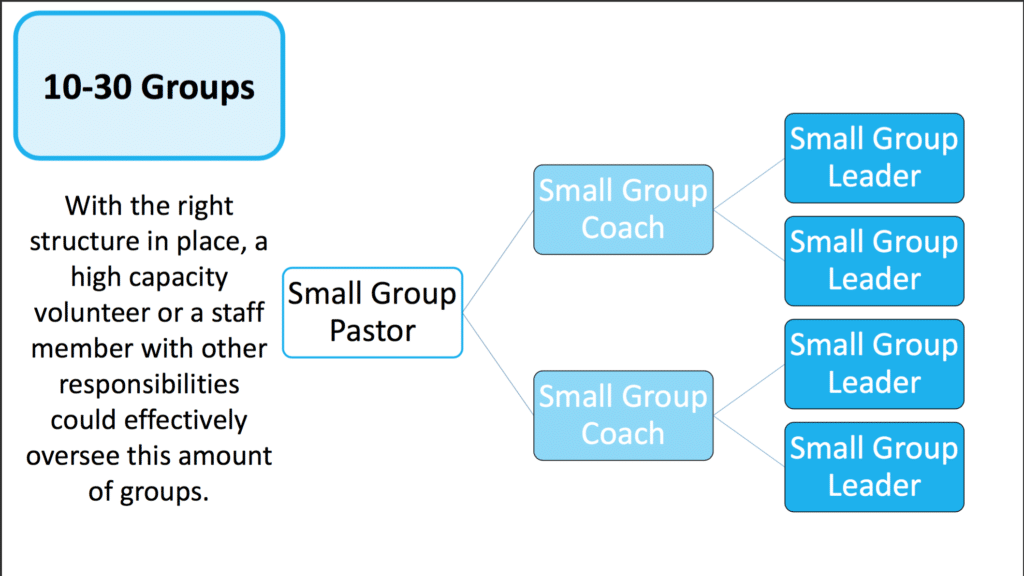
Church Small Group Structure For 30-50 Groups
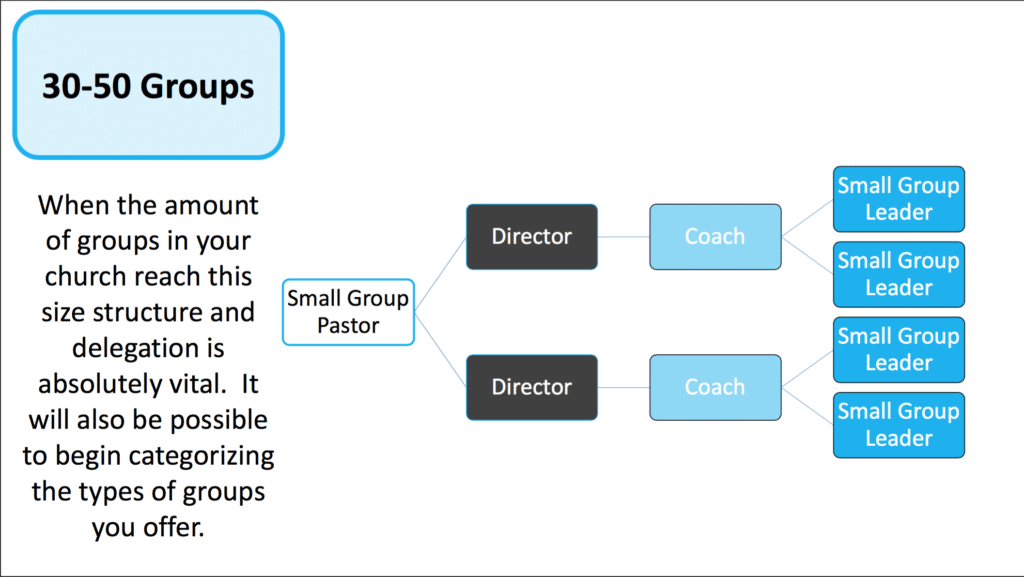
Church Small Group Structure For 70-100 Groups
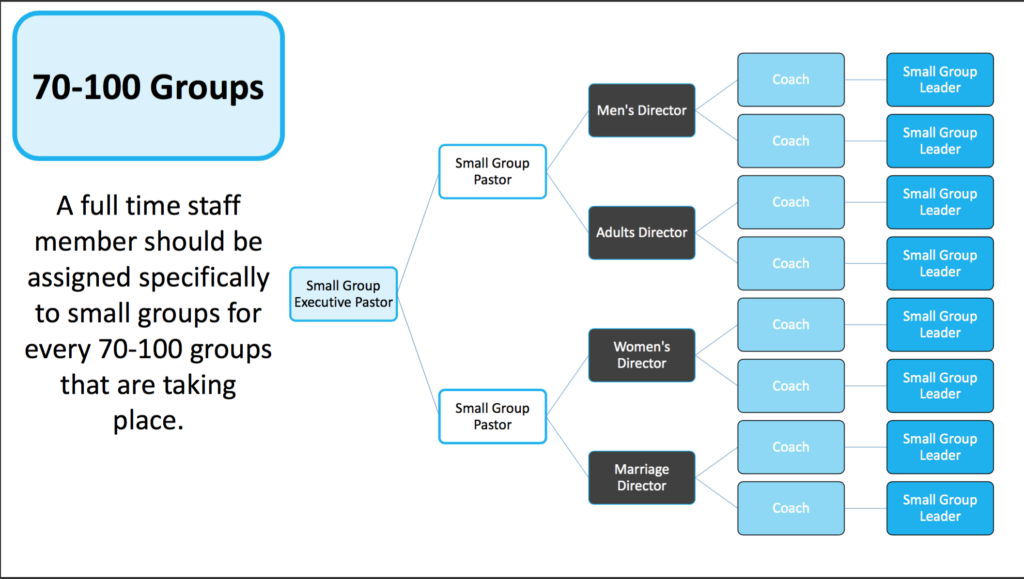
Determining which models your church should use depends on the number of groups that you plan to start with and the necessary roles you need to fill?
- Small-Group Leaders?
- Coaches?
- Directors?
- Staff Pastors?
- Small-Group Resource Development Team?
2. Identify Potential Small Group Ministry Team Members
Here are some prerequisites to consider for potential members of your small group ministry team:
- Are they committed to the church?
- Do they have the willingness to learn?
- Do they model godly character?
- Can you be friends with them?
- Do they believe what you believe?
- What do other people know about them?
- Do they have people skills?
- Have they completed an application?
- Has the point person or someone on the leadership team personally met with the potential leader?
- Have they served in other areas?
- Have they been involved in small group ministry before?
3. Clarify The Expectations Of Your Small Group Leaders
Below are some of the expectations and training shared in the Small Group Leader Training Manual.
A Small Group Leader Should:
- Pray regularly for everyone in your group.
- Ensure the care of your group members by being actively involved in a relationship with them.
- Provide a supportive atmosphere in which each group member can contribute.
- Identify and strengthen co-leaders.
- Maintain unity by representing the philosophy of ministry and theology of this church.
- Invite and welcome new people into a group and encourage group members to invite those inside and outside the church.
- Follow-up on all group members throughout the week.
- Attend scheduled church and small group leadership meetings.
4. Give Small Group Team Members Room To Grow And Develop
You can help your small group leader team to become better leaders in the following ways:
- Help them to identify their unique gifting.
- Encourage them to focus their efforts where they are the strongest and to empower others where they are weak.
- Remind them that growth takes time.
- Remaining patient because discipling others is a process.
Leading a small group is challenging. That’s why I wrote Intentional Small Groups. This ebook provides down-to-earth guidance for offering powerful, life-changing groups.
I created it for group leaders after leading and directing a small group ministry. The book is based on the questions and conversations from real small group experiences and ministry.
Intentional Small Groups is a complete guide for leaders that is divided into six parts specific to small group leader training!
- Leadership Essentials
- Understanding Spiritual Growth
- Multiplication
- Keys To A Successful Small Group
- Navigating Conversations
- Final Encouragement
If you or your leaders lead a small group around a common interest, share a bible study, meet with other married couples, have a prayer group, or gather in a home or a coffee shop, the principles in this guide will equip you and provide effective small group leader training.
I wrote this eBook to help you lead your group in the most effective way possible.
5. Provide Ongoing Encouragement And Equipping
Below are a variety of ways you can encourage and equip your team:
- Communicating Expectations (repeatedly).
- Defining what is important (What is the win?).
- Providing access to training (personal & systems).
- Praying and supporting each layer of leadership.
- Ensure access to leadership and coaching
- Ensure coaches and pastors are providing care
- Create a Facebook Page for your group leaders
- Email newsletter
- A blog
- Team nights and gatherings
There are several ways to strengthen your team. The most important thing is finding ways to build relationships and maintain connections. Don’t be afraid to experiment with what works best for your team.
And, of course, you can also direct them to the small group section of this blog.
Step Five: Prepare For A Strategic Small Group Ministry Launch
If you sat down with a few of the key leaders in your church, could you all agree on what is most important to your church?
Out of the short sample list below, which are the most important to your church?
- Church Calendar
- Upcoming Men’s Breakfast
- Website
- School Outreach
- Women’s Ministry Fundraiser
- Bulletins
- Small Groups
The point is there will always be ministries, announcements, and demands that will pull your attention.
When ministry leaders try to make everything important, nothing can be!
To resolve this, you and your team must focus your efforts on the specific ministries that you most want your people to participate.
People can only do so much! Think for a second about all of the demands they have too.
- Career
- Recitals
- Church
- Family
- Soccer Practice
- Hobbies
- Date Nights
- Chores
- Birthday Parties
and the list could go on!
As a church leader and small group advocate, your job is to make the most of the limited time you have with your people.
Below is a model to help your church determine what areas of ministry receive the most time and effort.
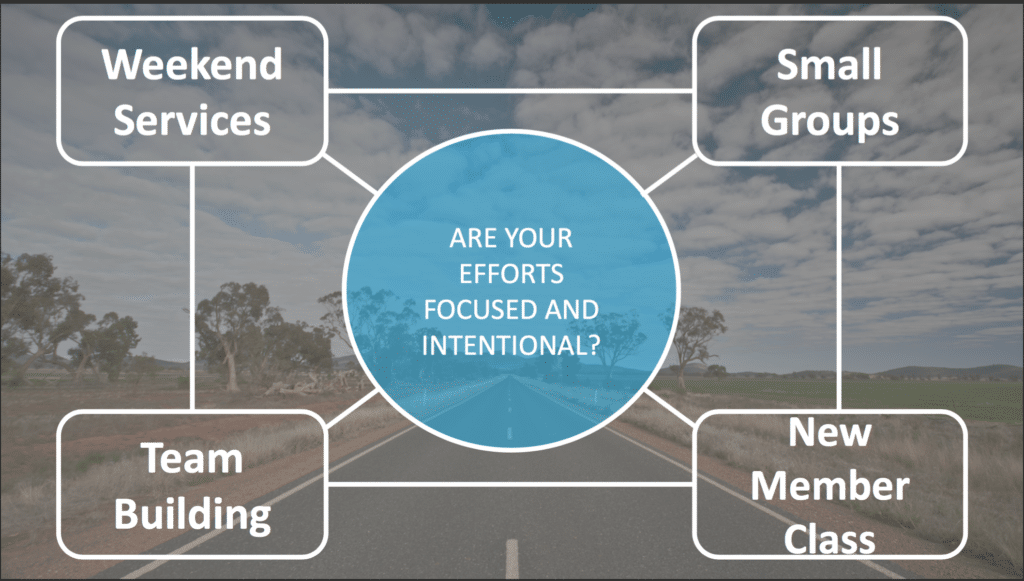
By focusing on less, you’re able to provide resources and attention to ministries with the potential for the greatest impact.
Below is a brief explanation of why I believe these four areas are the key places to focus on.
WEEKEND SERVICES
Your weekend service is an opportunity to foster a dynamic environment for people to be Equipped, Encouraged, Unified, and Matured in Jesus Christ. (Eph. 4:11-16).
SMALL GROUPS
The purpose of small groups is to have smaller environments for your church family to experience community and grow spiritually.
The reason for a new member’s class is it’s a chance to introduce and invite those who are new to your church to serve and engage. It is also an opportunity for your church to share more about your beliefs and why you do what you do.
TEAM BUILDING
Also, focusing on creating an opportunity for people to serve widens your impact as a church and allows people to develop their gifting.
Every ministry effort should support most effectively accomplishing your church mission statement.
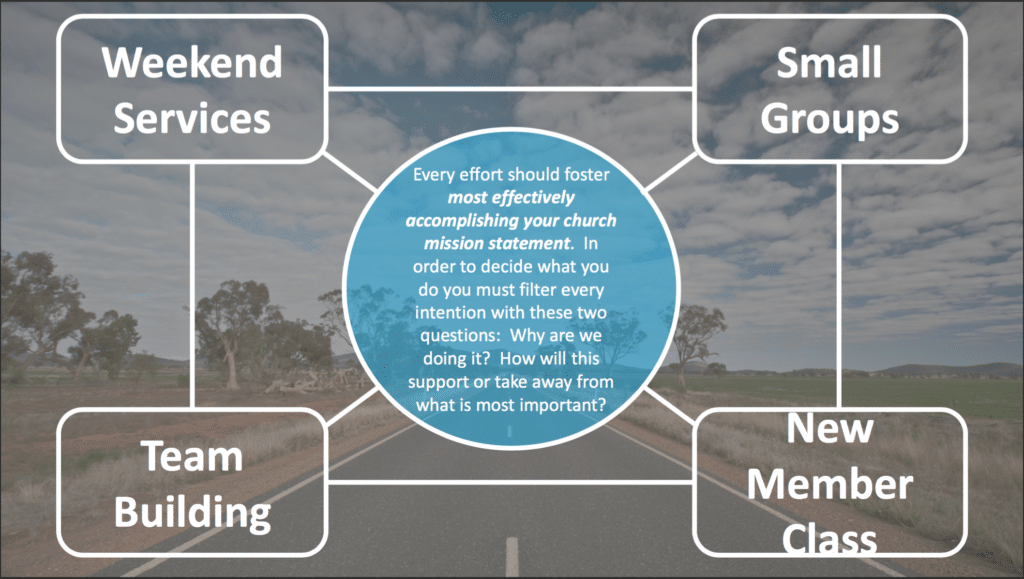
To decide what efforts your church prioritizes, you must filter every effort with these two questions:
- Why are we doing it?
- How will this support or take away from what is most important?
After deciding on the few areas that are the most important for your church to focus on, it’s time to start taking steps to implement a small group into your church.
7 Essential Elements Of Launching Small Groups In Church
- Get the influencers in your church on board!
- Designate and empower a Small Group Ministry Leader!
- Set a date to launch small groups at your church!
- Have existing groups in place!
- Focus church efforts toward the launch. – Give it the attention it deserves!
- Make it easy for people to be a part!
- Share the vision for small groups (with a passion)!
The key is to make it easy for people to get information about the groups at your church. You can do this by providing cards, posting them on your website, or building an app… however you do it, make it easy!
If you follow these steps, you can expect to have a successful, exciting small group launch that your church will be ready for!
Step Six: Evaluate & Assess The Health Of The Small Groups
A healthy small group ministry will primarily accomplish two things: Christian community and spiritual growth. The people of your church will experience community and spiritual growth when small group members share Life, God, and Prayer.
Below are brief definitions of what I mean by Sharing Life, God, and Prayer:
- LIFE: Every member should have the opportunity to share what is going on in their life.
- GOD: Every meeting is an opportunity to share what the Bible says about our lives and circumstances.
- PRAYER: Every member needs people who pray for them and know their needs.
Let’s take a closer look at how these three elements within a small group environment will spur spiritual growth within your church.
Spiritual Growth is a dynamic process that is highly personal and relational at the same time.
Hebrews 10:23-25 (NIV) 23 Let us hold unswervingly to the hope we profess, for he who promised is faithful. 24 And let us consider how we may spur one another on toward love and good deeds, 25 not giving up meeting together, as some are in the habit of doing, but encouraging one another—and all the more as you see the Day approaching.
Scripture like this makes it clear that believers should intentionally encourage growth in each other.
A group leader’s job is to do two things: Plant and Water (1 Cor. 3:7-8).
A small group leader can plant and water within their group by:
- Cultivating Spiritual Growth
- Encouraging Spiritual Growth
- Preparing Opportunity For Spiritual Growth
Group leaders can cultivate, encourage and prepare for growth by:
- Building trust within their group.
- Providing support to the group members.
- Displaying love and patience to those who are a part of the group (1 Cor. 13:4-7).
A small group ministry will provide the opportunity to meet every person’s three basic needs. Every person needs:
- Affection (1 John 4:10-11)
- Protection (Galatians 6:1-2)
- Connection (Romans 12:4-5)
Build a small group ministry that empowers your leaders.
Give your group leaders the freedom to:
- Offer groups around their interests
- Offer groups according to their schedule
Group leaders will engage more when they can offer small groups according to their interests and passions.
It is common to refer to this approach as free-market or interest-based small groups. This means that the options are almost limitless.
- Bible Studies
- Marriage
- Basketball
- Worship
- Prayer
- Men’s Groups
- Women’s Groups
- Seniors
- Biblical Prophecy
- Creative Arts
- Young Mothers
You will never be able to think of all the different small group possibilities. So don’t try; let your leaders lead based on their interests.
5 Elements Of A Successful Small Group:
- Help others grow spiritually
- Identify leadership
- Build trust
- Group Discussion
- Intentional About Multiplication
3 Guidelines For Small Group Meeting Frequency:
- Ideally, three times a month
- Be mindful that groups do have a “lifespan.”
- Groups tend to do the best in seasons of “new beginnings” (New Year, Spring, Fall)
I hope this has been helpful to you! I believe in small groups. Apply this powerful framework at your own pace. Each step will guide you toward exactly what to do next.
In addition to the framework above for starting a small group ministry at your church, I offer a few more ways to help you build a small group ministry.
When you buy any of the Building Healthy Small Group bundles, you can:
1. Utilize a proven step-by-step process for how to start a small group ministry at your church.
2. Receive a ministry structure guideline based on the size of your church so that you know exactly how to delegate small group ministry-related responsibilities.
3. Apply the vision-building framework to your church’s messaging. Building Healthy Small Groups will help you to create compelling messaging to inspire your leaders and church family to be involved.
Is Your Church A Building People Go To Or A Place Where Friends Gather?
WHAT’S MY INVESTMENT?
How would your church be different if you decided to build more friendships and connections?
What could happen if you built a small group ministry that helped your church and its people grow?
The church is the last place where people should feel lonely and disconnected! If they do, it won’t be long before they slip out of a chair and out the back door. A lack of opportunity for deeper friendship and spiritual growth could be costing your church already.

The Building Healthy Small Groups bundles include:
-
-
- 6 Steps To Launch, Grow And Maintain A Healthy Small Group Ministry
- 120-page downloadable workbook
- Access to additional bonus worksheets and resources
-

Purchase Building Healthy Small Groups

